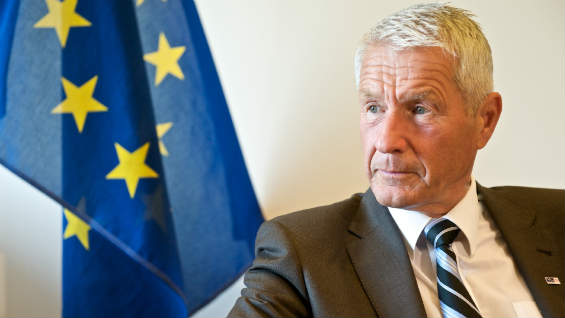“The past 12 months have seen a gear shift in Europe’s security concerns, - points out the Secretary General Thorbjørn Jagland in his latest annual report. - Recent terrorist attacks have sent a shockwave through our societies. Unco-ordinated responses to the migrant crisis have sustained chaos at our borders. Lasting peace has still not been secured in eastern Ukraine. The recent resumption of hostilities in Nagorno-Karabakh has reminded us how swiftly frozen conflicts can thaw. Combined with ongoing economic uncertainty, such insecure conditions are creating fertile ground for nationalists and xenophobes who seek to exploit public anxiety. Hate crime, anti-Semitism and Islamophobia are on the rise. Trust in state as well as European institutions is in decline.[…]
Such developments pose serious problems for our shared security. In today’s Europe nations must work together if they are to successfully combat the many threats which cross our borders. Yet the rules and norms which constitute the basis of this co-operation are being challenged from multiple sides and increasingly, in public discourse, we see the politics of solidarity, generosity and tolerance give way to chauvinism, division and fear. I am therefore using my third annual report to issue an appeal to all in Europe who value open democracies and inclusive societies: we must urgently demonstrate that safe and stable states are those which foster cohesion and act in concert with their neighbours. I encourage governments, parliamentarians and civil society to examine carefully the detailed analysis across it exposes Europe’s democratic shortcomings, which require our immediate attention.”
“Democratic citizenship and human rights education are […] increasingly important in addressing discrimination, prejudice and intolerance, and thus preventing and combating violent extremism and radicalisation in a sustainable and proactive way. […] While taking stock of the present situation, it seems highly desirable to maintain the political momentum by making this a long-term commitment. In the framework of our changing societies and the new requirements arising therein, the charter [on citizenship and human rights education] could be revisited with the aim of updating this instrument to make it stronger and binding, in the form of a framework convention on education for democracy”.
The action proposed by the report in the area of education includes the following:
- To review the Council of Europe’s activities on Democratic Citizenship Education and Human Rights Education, evaluate progress and identify and share best practice, as well as assess the need for turning the current Charter on citizenship and human rights education into a binding legal instrument;
- To improve the visibility for citizenship and human rights education in school curricula, by supporting national co-ordination mechanisms for citizenship and human rights education and by promoting comprehensive and sustainable national approaches;
-
To endorse the Council of Europe Reference Framework of Competences for Democratic Citizenship, as a key part of any government’s response to the challenges facing our societies; invite member states to make full use of the reference framework by piloting and integrating it into national education systems.
2016 Report on the state of democracy, human rights and the rule of law in Europe



